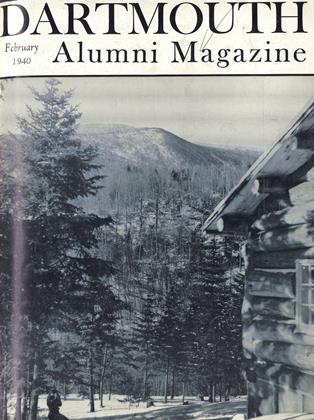PROFESSOR BRUCE W. KNIGHT, teacher, author, and humorist, is one of Dartmouth's most popular instructors in economics. His interests are many, and he has something which surely his "dismal" science needs, an ironic humor and an intellectual humility. I am also glad to record that he has taken up golf. My thanks to him for the following:
"If Mr. John R. Tunis is right about the terrible problem of unemployment among the brain cells of Harvard alumni, perhaps this is no place to talk about books on war and depression. The conditions he describes remind me of a Hanover hostess who broke a lull in the conversation by pouncing on an economist to demand: 'Mr. X, what does cause depressions?' As Mrs. Y obviously expected the answer to use up a whole sentence, Mr. X fitted the punishment to the crime by replying, 'Maladjustments.'
"I do not say Mr. Tunis is so right that I must confine myself to books which I have read aloud to my children, but I do believe there is enough in what he says to warrant one observation. In the 'social sciences' our main problem is to get as far as a beginning, that is, to find out what the problem is. If we begin curing depressions caused by 'overproduction' or wars caused by 'Hitler,' we are sunk from the start. As Tosh Billings remarked: 'The main trouble with us ain't ignorance: it's knowin' so much that ain't so.' From this it follows that it is less important to read new books than to read good ones. It is better to play a tight game with a first-rater than to roll up the score over a set-up. Limiting recommendations to good books also effects a great saving of woodpulp. On this understanding, here goes:
"Of the business-cycle books, culled from scores of them, which our majors in economics are using, the following are Quality Folks:
"PROSPERITY AND DEPRESSION, by Gottfried von Haberler, revised edition, League of Nations, Geneva, 1939. After hunting far and wide for a man equipped to synthesize the complex literature of this field, the League happily hit on Haberler. The book is not easy, but as a piece of analysis and organization it is a masterpiece. Haberler reviews all the leading theories; scrutinizes the work of Keynes; produces a synthesis of his own.
"STRATEGIC FACTORS IN BUSINESS CYCLES, by John Maurice Clark. National Bureau of Economic Research, New York, 1935. The outstanding feature is the development of the 'principle of the acceleration of derived demand.'
"FULL RECOVERY OR STAGNATION?, by Alvin Harvey Hansen. W. W. Norton & Co., New York, 1938. Long a leading authority on cycles, Hansen now stresses his belief that we are up against something more than mere business cycles; that we are in for a long period of stagnation unless we do a much better job of opening up new outlets for investment. He tells what can be done before deciding that the jig is up with capitalism. As for the jig, possibly 'it is later than you think.'
"WAR IN THE TWENTIETH CENTURY, a symposium, edited by WilliamWaller and published by The Dryden Press, New York, 1940, is what the title implies: a description of "the leading phases of modern war rather than a program of remedies. It deals mainly with the causes, conduct, and consequences of the First World War and the present European War. The political, propaganda, and economic fronts are well treated. The military front is not. This important gap can be closed by reading Major G. F. Eliot's THE RAMPARTS WE WATCH (Reynal), Liddell Hart's THE DEFENSE OF BRITAIN (Random House), and Ludwig Renn's WARFARE: THE RELATION OF WAR TO SOCIETY (Oxford)."
 View Full Issue
View Full Issue
More From This Issue
-
 Article
ArticleMore Than Professor
February 1940 By JOHN HURD JR. '21 -
 Article
ArticleThe College In The Sixties
February 1940 -
 Class Notes
Class Notes1915*
February 1940 By CHARLES R. TAPLIN -
 Article
ArticleEducation Without Books
February 1940 By Davis Jackson '36 -
 Sports
SportsBig Green Teams
February 1940 By Whitey Fuller '37 -
 Article
ArticleHanover Browsing
February 1940 By HERBERT F. WEST '22
HERBERT F. WEST '22
-
 Article
ArticleHANOVER BROWSING
November 1934 By Herbert F. West '22 -
 Article
ArticleHANOVER BROWSING
April 1936 By Herbert F. West '22 -
 Article
ArticleHanover Browsing
January 1946 By HERBERT F. WEST '22 -
 Article
ArticleHanover Browsing
February 1946 By HERBERT F. WEST '22 -
 Article
ArticleHanover Browsing
December 1946 By HERBERT F. WEST '22 -
 Article
ArticleHanover Browsing
June 1947 By HERBERT F. WEST '22
Article
-
 Article
ArticleDR. RAYMOND PEARL '99 LOSES LIBRARY IN FIRE
February 1920 -
 Article
ArticleLEDYARD BRIDGE AT SUNSET
March, 1924 -
 Article
ArticleCoined "Parking"
October 1940 -
 Article
ArticleGive a Rouse
July/Aug 2010 -
 Article
ArticleAlumni News
Jan/Feb 2009 By Adam Blue '93 -
 Article
ArticleCaring about Health on the Reservation
SEPTEMBER 1987 By Lynmar Brock '55


